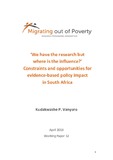‘We Have the Research but Where is the Influence?’Constraints and Opportunities for Evidence-Based Policy Impact in South Africa
Abstract
Research can generate evidence that can make a vital difference if utilised in decision-making, and policy or civil society practice. However, despite a considerable amount of optimism about research uptake in the Global South, little is known about the interface between research and policy in these settings. While campaigns or resistance on populist or popular causes in developing, post-colonial countries have frequently been recorded and investigated, neglible investigation has been done on how change on marginalised, ‘unpopular’ or contentious policy issues is effected using research evidence. This paper explores the research uptake and advocacy experiences of researchers and activists working on three unpopular and politically contentious causes; immigration, human trafficking and sex work - in a post-colonial context of South Africa. It finds little evidence that the communication of concerted empirical research has resulted in much uptake of the research or in sustained practical improvements for citizens and residents. The paper argues that notions of capacity building, knowledge brokering and building trust by bridging the science-policy gap that are gaining prominence in the recent literature are all important, but these alone may generate narrowness that corresponds poorly to the political complexity of the policy processes on these three issues. Technocratic policy and decision-making on these issues is currently the exception, not the norm because there is a lack of political will, which ties into the potential of an issue’s unpopularity to antagonise and fragment different constituencies and ethnic groups that politicians and policy makers represent. The paper concludes with a call for a two tier research methodology that complements a research project and advocacy campaign’s substantive research or activities with a parallel study of the particular issue’s policy processes bearing into mind environmental incentives that are driving certain kinds of exclusion, obstacles and who can be mobilised.

